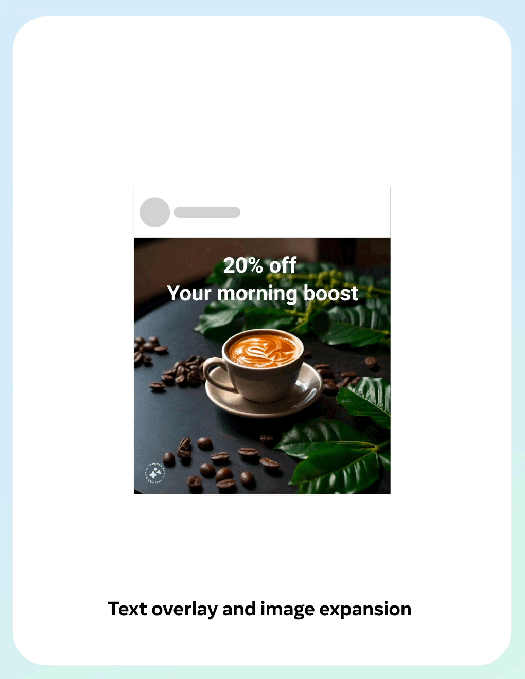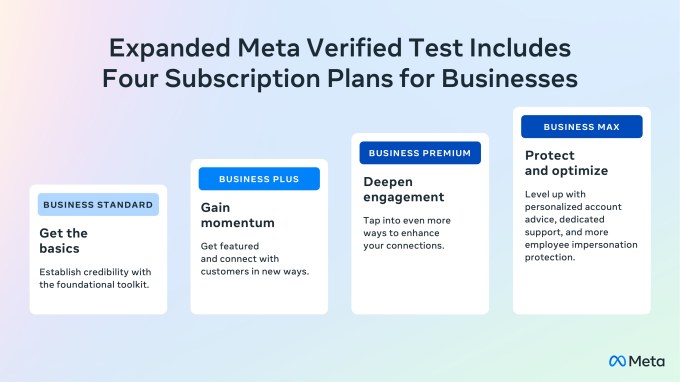Meta is rolling out an expanded set of generative AI tools for advertisers, after first announcing a set of AI features last October. Now, instead of only being able to create different backgrounds for a product image, advertisers can also request full image variations, which offer AI-inspired ideas for the overall photo, including riffs that update the photo’s subject or product being advertised.
In one example, Meta shows how an existing ad creative showing a cup of coffee sitting outdoors next to coffee beans could be modified to present the cup, from a different angle, in front of lush greenery and coffee beans, evoking imagery reminiscent of a coffee farm.
This may not be a big deal if the image is only mean to encourage someone to visit a local coffee shop. But if it was the coffee cup itself that was for sale, then the AI variations Meta offers could be versions of the product that didn’t exist in real life.
The feature could be abused by advertisers who wanted to dupe consumers into buying products that don’t actually exist.
Meta admits this is a possible use case, saying that an advertiser could tailor the generated output with the coming Text Prompt feature with different colors of their product, from different angles and in different scenarios. Currently, the “different colors” option could be used to dupe customers into thinking a product looked different than it does in real life.
As Meta’s example demonstrates, the coffee cup itself could be transformed into different colors, or could be shown from different angles, where each cup has its own distinct swirl of foaming milk mixed in with the hot beverage.
However, Meta claims that it has strong guardrails in place to prevent its system from generating inappropriate ad content or low-quality images. This includes “pre-guardrails” to filter out images that its gen AI models don’t support and “post-guardrails” that filter out generated text and image content that doesn’t meet its quality bar or that it deems inappropriate. Plus, Meta said it stress-tested the feature using its Llama image and full ads image generation model with both internal and external experts to try to find unexpected ways it could be used, then addressed any vulnerabilities found.
Meta says this feature has already begun to roll out, and in the months ahead, advertisers will be able to provide text prompts to tailor the image’s variations, too.

Image Credits: Meta
Plus, Meta will now allow advertisers to add text overlays on their AI-generated images with a dozen of the most popular font typefaces available to choose from.
Another feature, image expansion, also introduced in October 2023, will now be available to Reels in addition to the Feed, across both Facebook and Instagram. This option leverages AI to help advertisers adjust their image assets to fit across different aspect ratios, like Reels and Feed. The idea is that advertisers could spend less time repurposing their creative assets for different surfaces. Meta says text overlay will work along with image expansion, too.
One advertiser, smartphone case maker Casetify, said that using Meta’s GenAI Background Generation feature led to a 13% increase in return on its ad spend. The company had tested the option with its Advantage+ shopping campaigns, where the AI features first became available in the fall. The updated AI features will also be available through Ads Manager via Advantage+ creative, as before.

Image Credits: Meta
Beyond images, Meta’s AI can be used to generate alternate versions of the ad headline, in addition to the ad’s primary text, which was already supported by leveraging the original copy. Meta says it’s testing the ability for this text to also sound like the brand’s voice and tone, using previous campaigns as its reference material. Text generation capabilities will be moved to Mets’s next-gen LLM (large language model), Meta Llama 3.
All the generative AI features will become available globally to advertisers by the end of the year.
Outside of the AI updates, Meta also announced it would expand its subscription service, Meta Verified for businesses, to new markets including Argentina, Mexico, Chile, Peru, France, and Italy. The service began testing last year in Australia, New Zealand and Canada.

Now, Meta Verified will offer four different tiers to its subscription plan, all with the base features of a verified badge, account support, and impersonation monitoring. Higher tiers will include new tools like profile enhancements, tools for creating connections, and more ways to access customer support.
Meta Verified will be expanded to WhatsApp soon, the company also said.



![[CITYPNG.COM]White Google Play PlayStore Logo – 1500×1500](https://startupnews.fyi/wp-content/uploads/2025/08/CITYPNG.COMWhite-Google-Play-PlayStore-Logo-1500x1500-1-630x630.png)